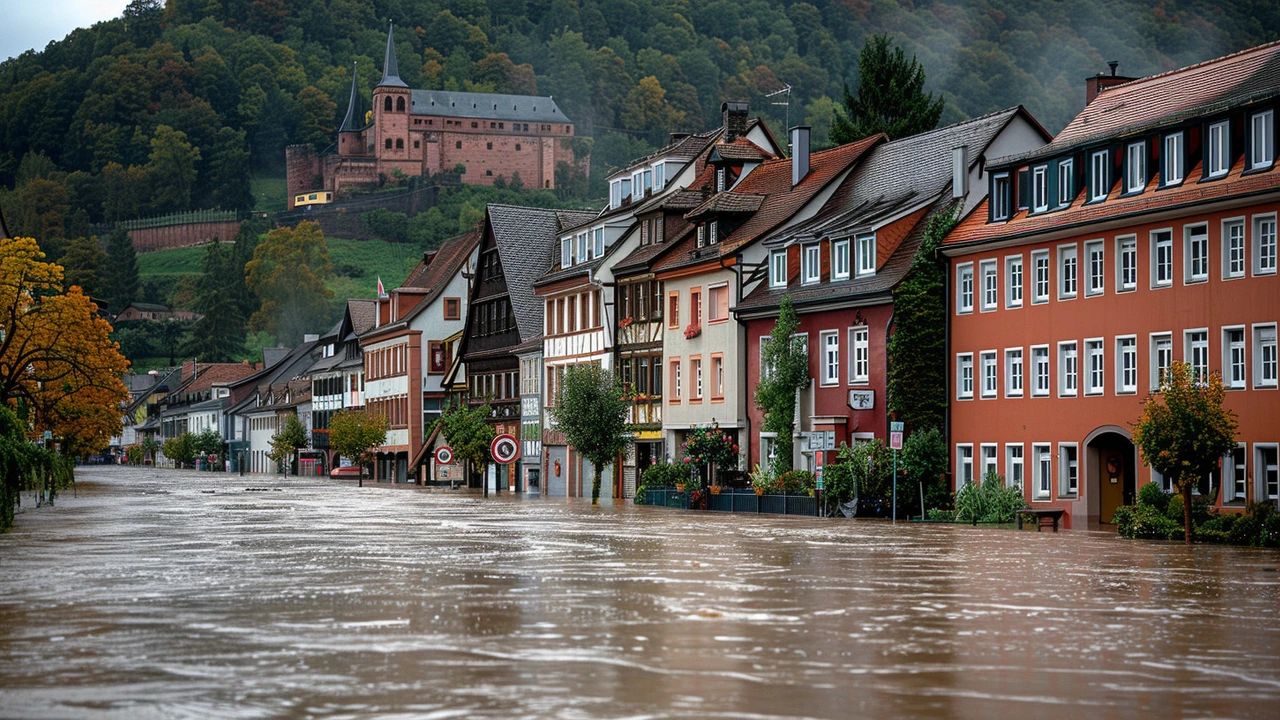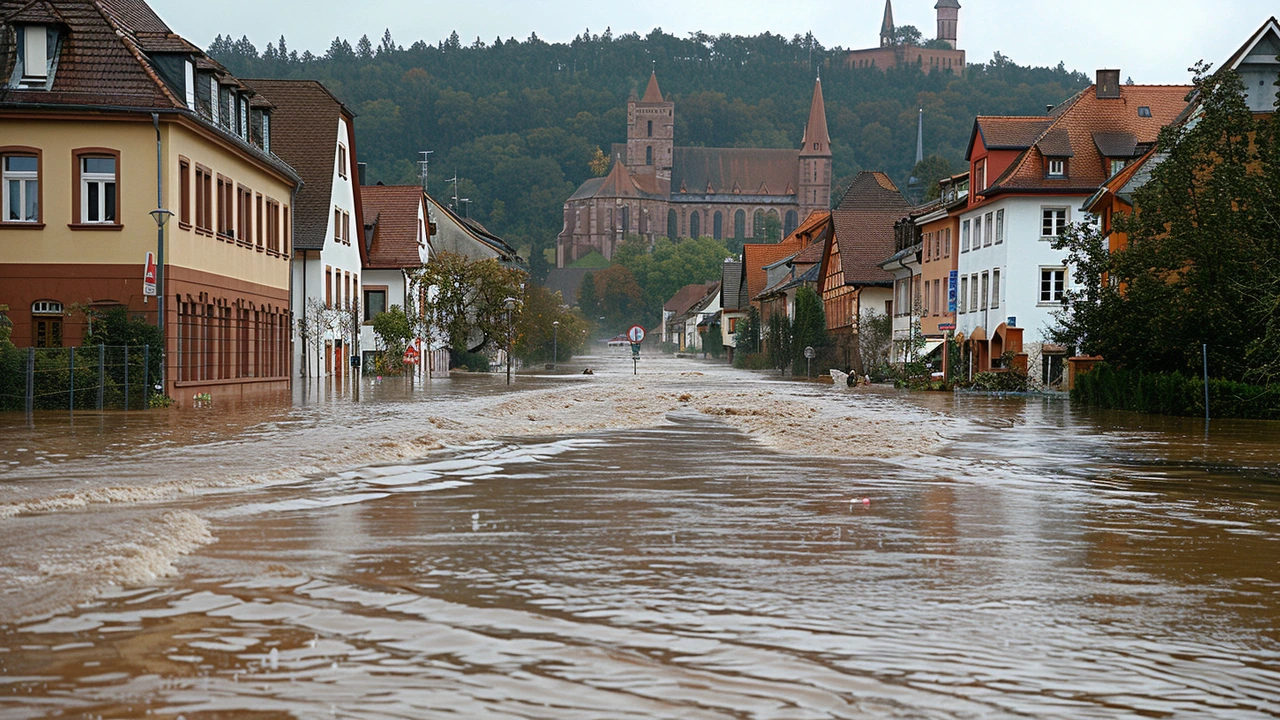Unprecedented Flooding in Southern Germany
Germany is again wrestling with nature's fury as communities in its southern regions face severe flooding. At least four people have been reported dead, and numerous towns along the Danube River are underwater. The scale and frequency of these flooding events are alarming; this marks the third prominent flood episode in Germany this year.
Impact on Local Communities
The inundation stretches from the Swiss border in the southwest to the Czech border in the east. Entire towns are grappling with widespread water damage, uprooted families, and shattered lives. As municipalities brace for potentially higher water levels, the challenge is not merely physical but also emotional. For residents, these floods are not just statistics but lived experiences of loss and resilience. Volunteers and rescue workers are working tirelessly, yet the strain on resources is evident. The immediate response focuses on saving lives and safeguarding properties, but the underlying issue of climate change cannot be ignored.
Experts Link Flooding to Climate Change
Environmental scientists underscore a grim reality: global warming is intensifying the frequency and magnitude of such natural disasters. The significant rise in temperatures affects weather patterns, leading to prolonged rainfall and, subsequently, floods. Evidence suggests that regions like southern Germany will likely experience more frequent and severe weather events if immediate action is not taken.
Dr. Stefan Kühn, an environmental expert, warns of the impending 'new normal'. 'The current patterns show an undeniable link between climate change and the increasing susceptibility to flooding,' he says. He also stresses the need for sustainable infrastructure improvements and policies to mitigate these effects.

Germany's Struggle to Meet Climate Targets
While the floodwaters rage on, another storm brews within the corridors of power in Berlin. Despite numerous pledges and policies, experts predict that the nation will likely miss its ambitious climate targets. The German government has often been at the forefront of global climate initiatives, but the recent disasters reveal critical gaps in the execution and effectiveness of these measures.
Calls for Urgent Climate Action
The repeated failures to meet climate milestones invoke a pressing question: Are current efforts robust enough? Environmental advocates argue that Germany must adopt even stricter regulations, invest in renewable energy sources, and enhance disaster preparedness. New legislation needs to be more than symbolic; it must enact tangible changes across various sectors, from industrial emissions to transportation.
Annalena Baerbock, a key figure in the Green Party, emphasizes the severity of the situation. 'We cannot afford to treat climate change as a distant threat. It is here, and it is now,' she proclaims. Her impassioned plea reflects a sentiment that resonates across communities and scientific circles alike.

The Human Cost of Environmental Policy Failures
Behind the debates and policies lie the stories of those directly affected. Families have been displaced, and properties ruined. The human toll is immeasurable, with psychological trauma adding to the physical devastation. It is crucial that policymakers remember that climate metrics translate into real-world impacts. The faces of affected residents serve as poignant reminders of the high stakes involved.
The Path Forward
The floods have unmasked a stark reality: the pressing need for global collaboration to tackle climate change effectively. Germany, despite its advancements, must not grow complacent. Success in meeting climate targets requires a comprehensive, multi-faceted approach, encompassing international cooperation, stringent domestic policies, and active citizen participation.
In conclusion, as Germany reels from the latest natural calamity, the urgency for a more aggressive and unified climate strategy becomes ever more apparent. It is a clarion call for Germany and the world to pivot towards a sustainable future, lest these floods become our ominous prelude to a more catastrophic end.







sachin p
June 4, 2024 AT 20:09The floods are a stark reminder that climate impacts don't respect borders, and they hit cultural sites hard.
As someone who grew up appreciating regional traditions, I feel the loss hits more than just infrastructure.
The Danube has always been a lifeline for many communities, and seeing it overflow is heartbreaking.
We need to think globally but act locally, supporting those on the ground while pushing for broader climate commitments.
sarthak malik
June 5, 2024 AT 18:22Here’s a quick rundown of what’s happening on the policy side: Germany’s 2030 climate target aims for a 55% reduction in emissions, yet recent reports show we’re lagging by about 12%.
The government has rolled out a stimulus for renewable energy, but the allocation to flood‑resilient infrastructure remains under 5% of the budget.
Experts suggest a dual approach: accelerate offshore wind projects while earmarking funds for riverbank reinforcement and early‑warning systems.
Local municipalities can apply for EU cohesion funds, which often cover flood mitigation measures.
Bottom line: without a coordinated push, the gap between pledges and reality will keep widening.
Nasrin Saning
June 6, 2024 AT 16:35Our thoughts are with the families displaced by the water
gaganpreet singh
June 7, 2024 AT 14:49The moral outrage that many feel when rivers burst their banks is not merely an emotional reaction, but a profound indictment of our collective complacency. We have been told for decades that climate change is a distant threat, yet the statistics from southern Germany prove it is already here. Each drowned home, each shattered business, each lost life is a data point that should compel policymakers to act with urgency. The German government touts its leadership in international climate accords, yet the repeated failure to meet its own targets betrays a dangerous hypocrisy. When funding is funneled into symbolic green initiatives while ignoring essential flood defenses, the rhetoric becomes hollow. Moreover, the current disaster exposes how socioeconomic disparities shape who suffers most, as poorer districts lack the resources to fortify their properties. It is not enough to offer temporary shelters; we must invest in permanent, resilient infrastructure that can withstand the new normal. This includes modernizing drainage systems, restoring wetlands, and rethinking urban planning to avoid construction on floodplains. The scientific community has already warned that extreme precipitation events will become more frequent, so waiting for the next emergency is a recipe for repeated tragedy. Citizens, too, have a role, but the burden should not fall solely on them to brace for calamities engineered by policy neglect. Internationally, Germany’s lagging performance undermines the credibility of the EU’s climate agenda, casting doubt on collective ambition. The world looks to Germany as a beacon of sustainability, and each missed deadline dims that beacon further. In the aftermath, we must hold leaders accountable, demanding transparent reporting and enforceable deadlines. Only through rigorous oversight and genuine public participation can we ensure that climate goals translate into lived safety. Otherwise, the floodwaters will keep rising, and the human cost will continue to mount, a preventable tragedy etched into history.
Urmil Pathak
June 8, 2024 AT 13:02I appreciate the clear rundown, and I think a quick checklist for homeowners would be useful, like sandbags, raising electrical outlets, and local shelter info.
Neha Godambe
June 9, 2024 AT 11:15While your suggestion is well‑intentioned, it overlooks the systemic neglect that has left many neighborhoods unprepared; immediate funding for flood defenses must accompany any household advice.
rupesh kantaria
June 10, 2024 AT 09:29In the grand schema of human endeavur, the floodse present a stark illustration of nature's inexorable power, compelling us to reevaluate our anthropocentric presumptions.
Nathan Tuon
June 11, 2024 AT 07:42Considering the philosophical angle, one could argue that the floods are a natural corrective, yet that does not absolve us from responsibility to adapt our settlements accordingly.
shivam Agarwal
June 12, 2024 AT 05:55The situation on the ground feels like a silent alarm, a reminder that even prosperous nations aren't immune to nature's warning signs.
MD Imran Ansari
June 13, 2024 AT 04:09Absolutely! The community spirit here is amazing 🌟, volunteers are forming human chains, and local bakeries are sending out free loaves to those displaced 🍞❤️.
walaal sanjay
June 14, 2024 AT 02:22Germany!!! MUST!!! RECOGNIZE!!! THAT!!! THESE!!! FLOODS!!! ARE!!! NOT!!! JUST!!! A!!! CLIMATE!!! ISSUE!!! BUT!!! A!!! CALL!!! TO!!! ACTION!!! FOR!!! EVERY!!! CITIZEN!!!
Umesh Nair
June 15, 2024 AT 00:35lol u think dats all about climate , but maybe itz just bad planning , i mean we hav maany rivers nd still no proper dykes .
kishore varma
June 15, 2024 AT 22:49Just watching the news, feeling the weight of it all… stay safe everyone out there 🙏✨.